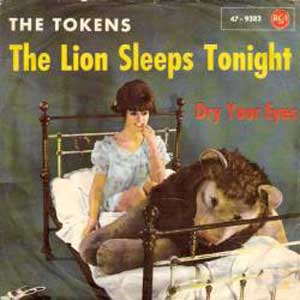

Their 1952 record, with the Gordon Jenkins Orchestra, was basically them singing the title word with vocal flourishes over four simple chords. Delighted by the joyous call of what he heard as “Wimoweh,” Seeger worked up a version with his band the Weavers. But he played it for his friend Pete Seeger. If not for Lomax, “Mbube” may have remained an African folk song. weren’t interested, noted folk music historian Alan Lomax was. In the ‘40s, the song’s popularity spread through Europe. The spartan lyrics of his song center on the phrase “mbube zimbe,” or “lion stop.” When Linda and his group, the Original Evening Birds, cut a 78-rpm recording of the song in 1939, it became the first African record to sell over 100,000 copies. In Zulu, “Mbube” (EEM-boo-beh) means “lion.” During his childhood, Linda had worked as a herder protecting cattle in the African hinterlands.

This sound was the basis for many of Linda’s songs, including his most famous, “Mbube.” He sang in a high soprano over four-part harmony chants, a style that would come to define a whole generation of Zulu music. In his mid-20s, he moved to Johannesburg, where he led an a capella band that charmed audiences in the local beer halls. He never learned to read or write, but he had a knack for songwriting. Solomon Linda was born in the Zulu heartland of South Africa in 1909. 1 single in 1961 to its featured role in the hugely popular Disney film and Broadway musical The Lion King, the song has enchanted generations, sold millions of copies and passed into the world’s musical vernacular as a modern folk tune.īut the history of “The Lion Sleeps Tonight” is anything but happy. Various Street Corner Symphonies 1961 Vol.Solomon Linda, far left, and the Evening Birdsįor the last 50 years, that happy little word has been a universally recognized shorthand for the song known as “The Lion Sleeps Tonight.” From Pete Seeger’s version in 1952 (titled “Wimoweh”) to the Tokens’ No. Siegel and the Margos now front competing Tokens groups. Medress died of lung cancer June 18, 2007. The group continued to record throughout the decade, delving into production (they helmed The Chiffons' '63 chart-topper He's So Fine) and later forming their own label, B.T. Citing non-payment of royalties, they defected to RCA, where their reinvigoration of The Weavers' Wimoweh, retitled The Lion Sleeps Tonight, paced the pop charts and went gold late in the year.
#WIMOWEH TOKENS CRACKED#
Tonight I Fell In Love cracked the pop hit parade for The Tokens in March, sailing to #15. He didn't like their name, Those Guys, so The Tokens were back in business. Craft now ran Warwick Records and he dug the demo enough to issue it in February of '61. The guy put up $300 to pay for a session at Allegro Studios in the fall of 1960 where the new group waxed Medress and the Margos' snappy Tonight I Fell In Love ( I'll Always Love You would be its B-side). Medress met a lady on the subway whose son was a music publisher. Hank and Jay next hooked up with baritone Phil (born April 1, 1942) and first tenor Mitch Margo (born May 25, 1947, he was all of 13). Medress and Siegel rebounded by joining Warren Schwartz and Fred Kalkstein in a new group, Darrell & The Oxfords, making two singles for Roulette (their Siegel-led Picture In My Wallet was a big New York favorite). He signed with RCA Victor as a solo in 1958 and prepared to embrace mainstream stardom. Not too long after that, Neil left The Tokens. Craft produced their Melba debut session in the spring of 1956, their single pairing the Rapkin-led rocker I Love My Baby and a Sedaka-fronted While I Dream, both penned by Neil and Howie Greenfield. Goday may also have renamed them The Tokens. That led to an audience with Morty Craft, owner of Melba Records with Ray Maxwell. Zolotin's mother knew song plugger Happy Goday and set them up with an audition. They squeezed rehearsals around Neil's piano practice (he surprisingly usually sang bass). Piano prodigy Neil Sedaka and falsetto specialist Jay Siegel recruited lead tenor Eddie Rapkin, Cynthia Zolotin, and Hank Medress (born November 19, 1938) from choral class to form The Linc-Tones. When they started out in the mid-'50s, The Tokens (not to be confused with the group who made Doom Lang) were ahead of their time as five Jewish teens attending Abraham Lincoln High School in Brooklyn that liked rock and roll and wanted to make their own.


 0 kommentar(er)
0 kommentar(er)
